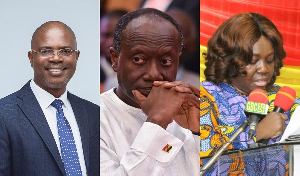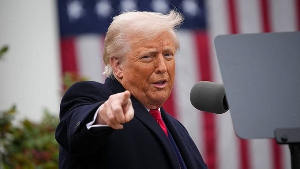The Enron and WorldCom so-called accounting problems are not unique but signs of the effects of capitalism on unprotected, corporate or politically unconnected investors. It should not be a total surprise to people in regards to these current uproars and abuses of corporate power in the American Corporate World. Those of us who grew up during the early days of independence in our countries of birth were educated on the pros and cons of capitalism and socialism by some of our progressive leaders.
The proponents of Capitalism were championed by the United States and that of socialism by the Soviet Union. Each was working to see the demise of the other ideology. We saw the collapse of Socialism and its subsequent celebrations in the Western countries.
The current problems in the world economy and especially the current situation in the United States have to be carefully analyzed. To do this, one has to revisit the arguments for and against both ideologies.
Capitalism is an economic theory and system on the principles of laissez-faire free enterprise. It calls for private ownership of property and the means of production, a competitive, profit-incentive system, individual initiative, an absence of governmental restraints on ownership, production and trade, and a market economy that provides order to the system as a result of the interplay of the forces of supply and demand. Socialism on the other hand is a system based on the rigid state control and operation of the economy and trade. (See Jack Plano and Roy Olton – International Relations Dictionary)
The key word to note is “profit incentive system”. It now calls to question as to why the hue and cry when these corporate leaders in cooperation with their “bought” political leaders are making all the profits they could in which way possible. This problem of the exploitation of the masses has been the argument advanced by the proponents of socialism as against capitalism.
The amassing of wealth through professional accounting systems by these corporate leaders does not surprise those of us from the developing countries. The accounting system was developed by the corporate world of which Arthur Anderson has been a member. The accounting system was developed in such a way as to manipulate the records and to “cheat” the uneducated investors whose monies are being used to create the artificial wealth for these corporate leaders. Those in high places such as the politicians or those with high level corporate connections are part of these manipulations. They know exactly what they are doing, they are not stupid. Is it coincidence that Arthur Anderson is the accounting firm representing both Enron and WorldCom?
It is now that the common investors have started to question the multimillion pay offs to these corporate leaders who have taken or shared almost everything in the covers and nothing left. The filing of bankruptcy under Chapter 11 was not by incidence but a well-calculated system to protect the corporate leaders. They are free to take their bounties and the next thing is to declare the corporate entity bankrupt and file for protection under Chapter 11. These are not incidences but political and constitutional protection that was put in place by the same corporate leaders through their political/legislative cronies in Congress.
If a corporate leader should resign and sell his shares and make a profit of over $40 million dollars, should this be regarded as money well earned or the manipulation of the system to enrich himself. Note once more that the aim of capitalism is self-enrichment and not seeking the welfare of the investors whose monies have been used in the first place.
Personally, I do not blame them because the system provides for it. They are greedy and are using the system pretty well. The politicians in the high achecelon of government are running around talking big and smart. These are hot balloons and nothing will come out of it. They have all benefited one way or the other. Their anguish is not geared towards improving the situation but towards the “poor” investors in their constituencies who are to vote for them in the next general election. They really care less. They are politicians and politicians are just that and nothing else. They lie to get their way through an issue or problem. I respect politicians but do not trust them. You cannot even trust a politician with a dog. Those who saw the movie – The American President – (or whatever the name of the movie) do you remember what the President did with the dog immediately he entered the White House. It may be a movie but it may be factual.
It is a normal process for politicians that if you have no solution to a problem forms a committee and tell the people – “we are looking seriously into it”.
Having said the above, how do we learn from these exploitations so that we do not allow African capitalists going the same way. There are a lot of “rich people” in Africa. They have their own empires and just like those in any other western country they have the political leaders in their “pockets”. These leaders make laws to protect their friends – the big businessmen. Some of them are called business tagoons. The exploitation of our natural resources is aided and abetted by the politicians through these businessmen.
During the hey days of independence in Africa, there were so many confusions as to which economic ideology is best fitted for Africa. Most of the African leaders at the time led by Dr.Kwame Nkrumah of Ghana, Julius Nyerere of Tanzania, Ben Bella of Algeria (to name a few) advocated the system of socialism. They believed that in this early stages of independence the Government should address the issues of development that will benefit the total populace. In countries such as Nigeria, Cote d’ivoire, Kenya, they embraced the system of capitalism. In Nigeria today, there are more billionaires whose total revenue – from whatever source – is more than the nation’s annual budget. They are filthy rich and they show it. Do we blame them? No, because they are practicing capitalism. However, their approach to acquiring worth is to the detriment of the total society.
Prior to the foreign assistance in the overthrow of Dr.Kwame Nkrumah, the Government changed its policy to what is called mix economy. This was a system in which both the government and the private sector play a key role in the economic development of the country. The Government initiated capital projects, which serve the interest of the people. Such projects included UAC Group of Companies, Kaiser Aluminum, Akosombo Dam, the Cocoa Marketing Board and many others. In this approach the interest of the country was a key factor in negotiations with private investors. The Government ensured that the people benefit from the success of these projects or enterprises. The Government also ensured that any joint venture partnership with a foreign entity should conform to the national economic development program. Many examples can be cited regarding joint venture partnership arrangements made by succeeding governments in Ghana in which the interest of the people were not taken into consideration nor did any such development conform to the national economic development agenda. For example, the agreement in Ghana with Dana Petroleum PLC regarding the drilling of the new oil discovery in Ghana is not in the best interest of the country. The foreign company gets 90% and the balance of 10% goes to the Government. This is being done under the umbrella of “private sector”. These contracts are limited to so-called exploration. The estimated oil found is 100 million barrels. This exploration face will be completed after the drilling of these millions of barrels. The details of the agreement are not yet published (at least to my knowledge) but it has to be carefully examined.
Another example is the loan by the Government with a so-called IFC (International Finance Consortium). This loan arrangement has received extensive coverage and I need not dabble into it any further. However, it is suffice to say that it is not in the best interest of the country. My key concern is that while the Government is stating $350M as the loan amount, the IFC is stating $1 billion dollars. The commission for this loan is too high. 3.5% is not the ideal commission rate for such an amount. The ideal rate should be no more than 1% of the loan amount whether $350M or $1 billion. The transparency stated by the Minister of Finance regarding the award of contracts is not convincing. The transparency should start with the loan process. The issue of the legitimacy of IFC is still unclear. The Ghanaian people have not even been advised if the World Bank has approved of the loan; the World Bank has denied any knowledge of this company. As this loan agreement has not been signed, it is important that the World Bank, unfortunately, should intervene and veto such an arrangement since it has the veto power on any government external borrowings.
In the modern day Africa, mix economy appears to be the best and must be a recommended approach to the continent’s economic development agenda. Mixed economic theory should be what is regarded in the United States, ruling from the Center. Former President Bill Clinton is an example of this. He used it perfectly and was very successful in his economic and political agenda during his eight years in office. He was able to see the goods in the liberal agenda and conservative agenda and blend them together to generate well-structured policies and legislation for the total well being of the country. In this instance, the ruling government, not only in Ghana, but throughout Africa should consider suggestions from opposing political parties so that they can have a middle ground and develop/initiate development programs that will benefit the people. The outright dismissal of opposition views by African governments should be stopped.
In the same token and approach, African leaders can review the ideologies of Capitalism and Socialism and take the middle ground, which is Mix Economy in their approaches to development in their various countries. The total implant/export of capitalism to Africa will not work in the African context. It is can be state here that it is not all perfect in the western countries that practice capitalism.
President & Chief Executive Officer
African Development Corporation

Views expressed by the author(s) do not necessarily reflect those of Ghanaweb.














